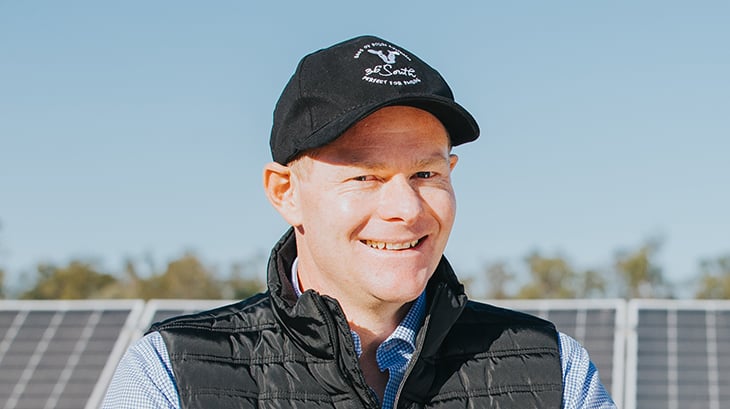Meet the SSG: Carl Duncan

Carl Duncan, Sustainability Steering Group.
We spoke with Carl Duncan, ABSF Sustainability Steering Group member, and Chief Sustainability Officer at Teys Australia.
What is your background and experience?
I started my career as an electrical technician working on industrial automation and controls in New Zealand. My eyes were opened to the world of energy and carbon management when I moved to Australia in 2004 and was inspired to re-train as an energy manager at Murdoch University.
I was lucky enough to land a role with Australian’s leading energy and carbon consultancy, advising ASX200 companies on resource efficiency. This was like a second apprenticeship for me, and I had the opportunity to progress into senior roles, and I then moved over to Teys Australia.
In my current role as Chief Sustainability Officer at Teys, I leverage my practical and academic background to implement pragmatic solutions to complex business problems. I have been exposed to several industries and processes as an energy and carbon auditor which helps me to understand what “good” looks like, and how other industries approach sustainability.
How did you become involved in sustainability?
It was a natural progression to expand my responsibilities from energy management to enterprise sustainability. The red meat value chain is complicated, as are consumer trends around sustainable food production. In response to these trends the Teys Executive Senior Leadership Team embarked on developing a sustainability strategy in 2021. I had the opportunity to lead this strategy and we are now in execution mode.
How has your experience in the processing and lot feeding sector, plus professional training, positioned you to contribute to the ABSF and to the sustainability of the beef industry?
In my role at Teys I get exposure to beef production and processing, value adding and lot feeding, as well as global customers across 60 international markets. Teys has developed a broad sustainability strategy that considers 52 indicators to demonstrate sustainability credentials on issues such as animal welfare, safe healthy affordable food, people and community, reducing water use, reducing greenhouse gases, and developing on-site renewables.
With the ABSF level I regularly draw on my management consulting background as a foundation for understanding issues, helping to set direction or supporting decisions. There are many cross overs here as we seek to add value to the industry. From a technical perspective my experience with carbon markets and GHG accounting are particularly useful as the sector progresses towards big goals like CN30 and the opportunities that go with it.
Why is sustainability so important to the Australian red meat sector?
As a globally connected industry providing high quality protein to international markets around the world, we need to demonstrate our sustainability credentials. It’s important to work towards good, realistic goals that are based on smart principles, and understand the value proposition of sustainability in things like lowering operating cost, maintaining market share, attracting premiums or avoiding discounts in some markets, and avoiding regulation.
It’s critical that we show, not just tell consumers, the Australian beef industry is committed to sustainability at every point in the value chain and a global leader through our projects, actions and initiatives.
Why is sustainability so important to you?
My passion for sustainability stems from my childhood growing up on a dairy farm in New Zealand. The importance of managing resources and caring for the environment, for our small part of the supply chain, had a significant impact on my outlook and values.
That ultimately led me to focus on sustainability. My focus in my studies and career has been on the energy and carbon space where efficiency, reduction and renewables have a major role to play.
Today, after 15 years in sustainability, I am proud to play my part in minimising our environmental impacts across a much larger and interconnected supply chain at Teys Australia, as we all work hard to increase production sustainably and feed the world responsibly.
What are our greatest opportunities?
The Australian beef industry is well placed to feed the world while supporting the transition to net zero, however we need to demonstrate our credentials. Customers and consumers are seeking to understand more about the food value chain. Broad statements on sustainability just won’t cut it in today’s environment where data and transparency is a vital part of doing business.
I have a firm view that goals with specific metrics are our greatest opportunity so that we can look at the trends and talk about changes over time, and then through our commercial lens, tell the story of what our product and industry is doing. We can leverage goals to drive investment to areas that need it and to increase market value.
More information
Contact:
Resources: